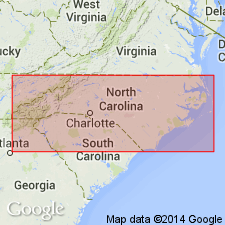
- Usage in publication:
-
- Tillery Formation*
- Modifications:
-
- Named
- Dominant lithology:
-
- Shale
- Graywacke
- Greenstone
- Slate
- AAPG geologic province:
-
- Piedmont-Blue Ridge province
Summary:
Tillery Formation named as basal formation of Albemarle Group (new). At type locality is composed essentially of finely laminated meta-shale exhibiting graded bedding. East and northeast of Troy anticlinorium contains graywacke and greenstone beds that grade upward into laminated slate. West of anticlinorium, formation has been metamorphosed into argillite. East and northeast of anticlinorium, formation grades downward into Efland Formation (new). West of anticlinorium the Tillery rests directly on Uwharrie Formation (new). Underlies McManus Formation (new). Age is early Paleozoic.
Source: GNU records (USGS DDS-6; Reston GNULEX).
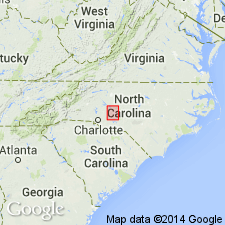
- Usage in publication:
-
- Tillery Formation*
- Modifications:
-
- Age modified
- AAPG geologic province:
-
- Piedmont-Blue Ridge province
Summary:
Age of Tillery Formation changed from early Paleozoic to Ordovician(?).
Source: GNU records (USGS DDS-6; Reston GNULEX).
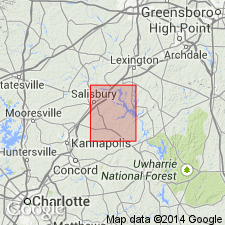
- Usage in publication:
-
- Tillery Formation*
- Modifications:
-
- Age modified
- AAPG geologic province:
-
- Piedmont-Blue Ridge province
Summary:
Age of Tillery Formation changed from Ordovician(?) to Cambrian.
Source: GNU records (USGS DDS-6; Reston GNULEX).
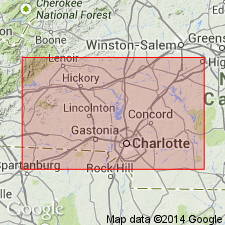
- Usage in publication:
-
- Tillery Formation*
- Modifications:
-
- Age modified
- AAPG geologic province:
-
- Piedmont-Blue Ridge province
Summary:
Age of the Albemarle Group and all of its formations is changed to uppermost Proterozoic on the basis of the fossil PTERIDINIUM, diagnostic of Vendian-Ediacaran fauna, identified from the middle or upper Floyd Church Formation. This had previously been misidentified as a Cambrian trilobite. A U/Pb concordia-intercept date of 586+/-10 Ma for zircons in the upper Uwharrie Formation sets a maximum age limit for the Albemarle.
Source: GNU records (USGS DDS-6; Reston GNULEX).
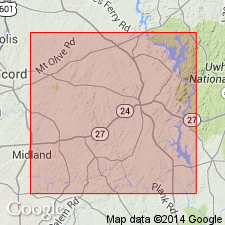
- Usage in publication:
-
- Tillery Formation
- Modifications:
-
- Revised
- AAPG geologic province:
-
- Piedmont-Blue Ridge province
Summary:
Authors adopt terminology established by Conley and Bain (1965) as modified by Gibson and Teeter (1984: Carolina Geol. Soc. Field Trip Guidebook). Three informal, unnamed members are recognized in south-central NC. Middle unit is characteristic Tillery of other reports. Strata within and adjacent to the Gold Hill shear zone, previously assigned to Tillery by Sundelius and Stromquist (1978), is here assigned to the Floyd Church Member of McManus Formation. Overlies Uwharrie Formation and gradationally underlies McManus Formation. No age given.
Source: GNU records (USGS DDS-6; Reston GNULEX).
For more information, please contact Nancy Stamm, Geologic Names Committee Secretary.
Asterisk (*) indicates published by U.S. Geological Survey authors.
"No current usage" (†) implies that a name has been abandoned or has fallen into disuse. Former usage and, if known, replacement name given in parentheses ( ).
Slash (/) indicates name conflicts with nomenclatural guidelines (CSN, 1933; ACSN, 1961, 1970; NACSN, 1983, 2005, 2021). May be explained within brackets ([ ]).

